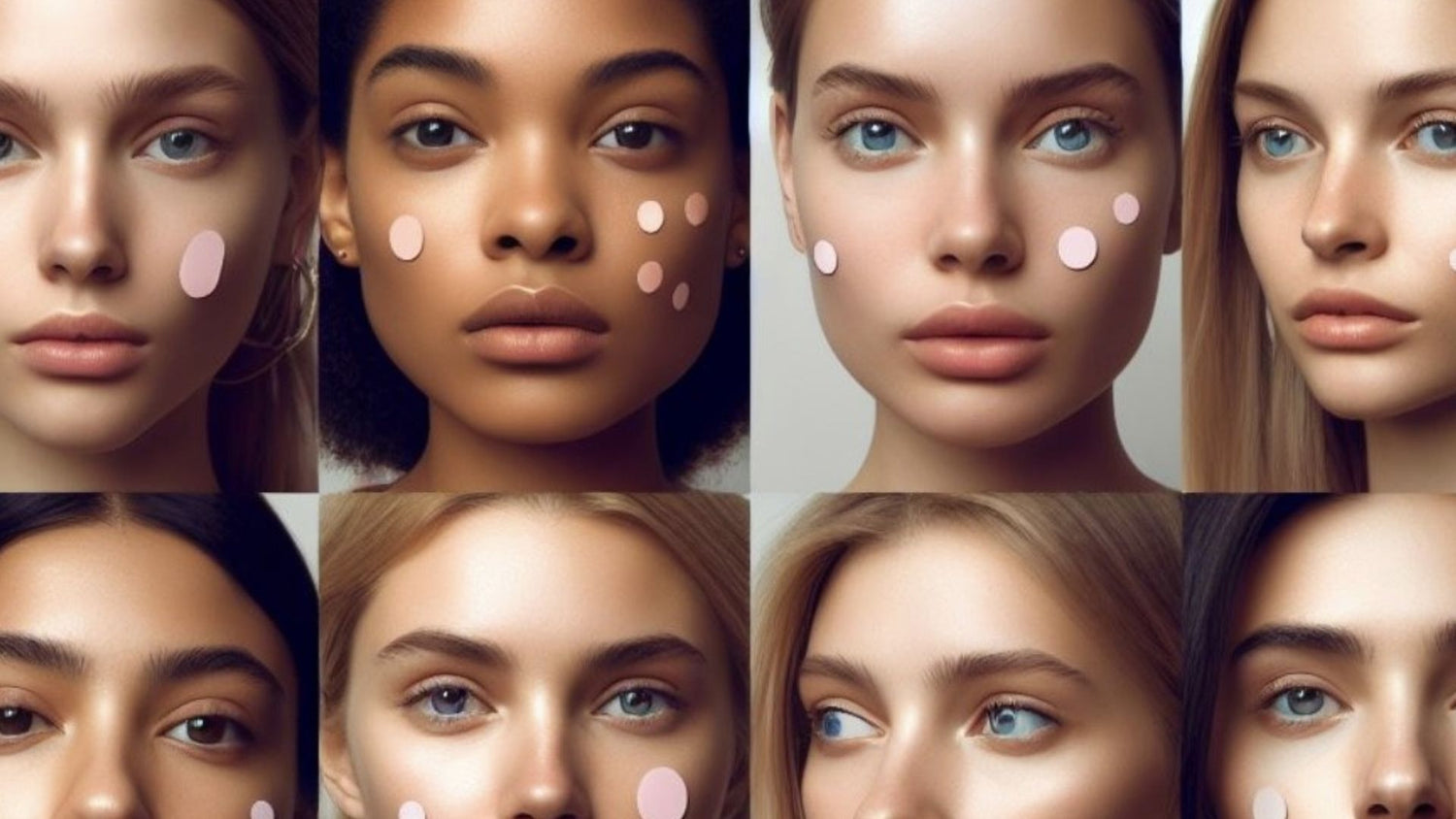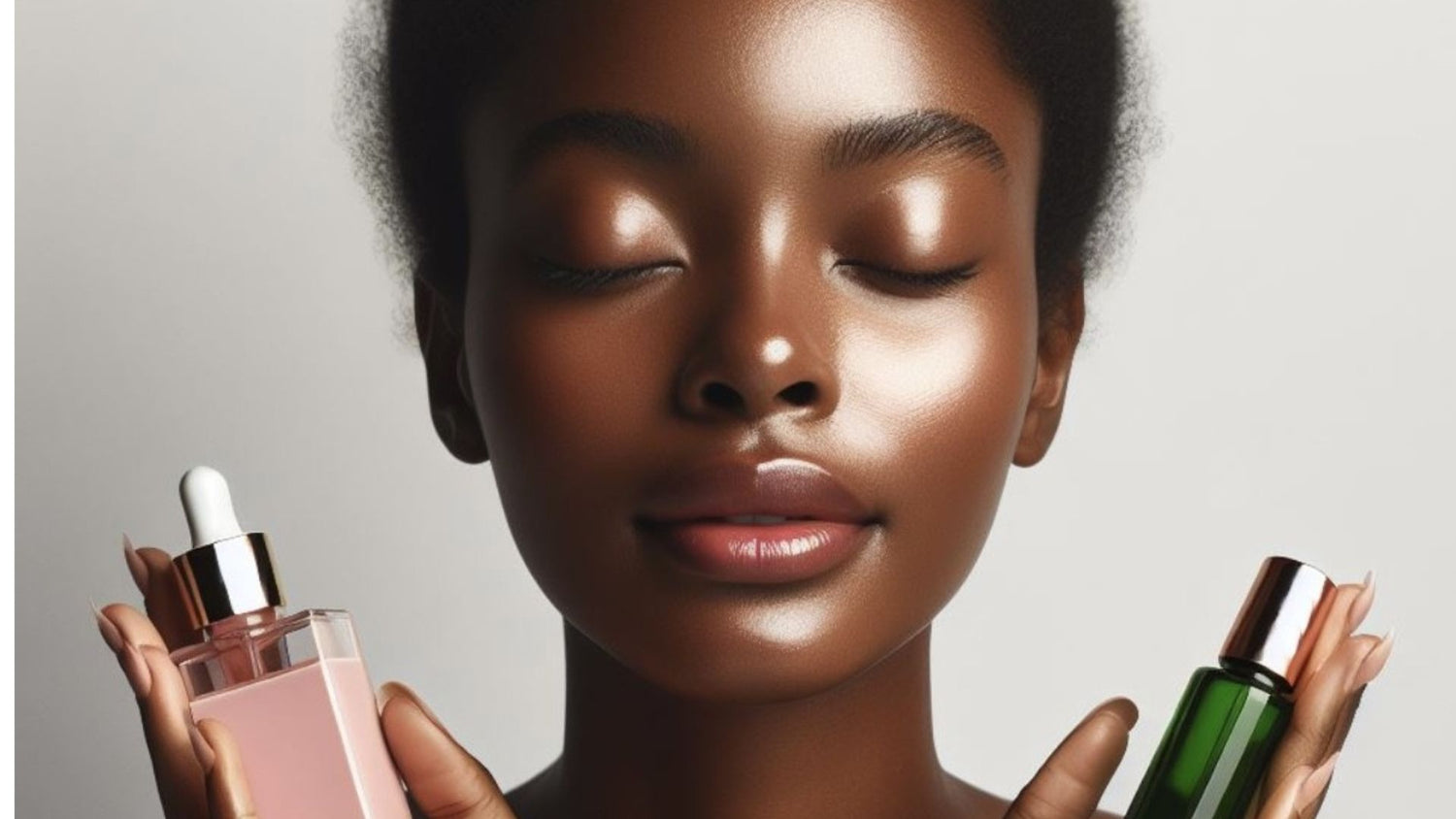Vitamin C (L-ascorbic acid) is a vital part of a good skincare regimen. Its benefits are many and proven. And, while consuming vitamin C as part of a healthy diet is also important for your body and your skin, the benefits of vitamin C serum for the skin have been widely accepted. In fact, the use of topical vitamin C is the preferred method for facial skin. So, what does vitamin C do for your skin?
Vitamin C is a powerful antioxidant. Antioxidants combat free radicals which are unstable molecules that cause damage to the cells and contribute to premature aging. These free radicals are produced in reaction to triggers like cigarette smoke, pollution or UV exposure in the environment, or to elements produced by your own body from normal processes like metabolism.
This can create oxidative stress which can damage cells and cause your skin to age faster, producing fine lines, wrinkles and dark spots. Antioxidants have been shown to counteract oxidative stress in laboratory experiments. Thus, one of the many benefits of vitamin C serum is that it aids in protecting your skin against the damage caused by these free radicals.
Free radicals are also responsible for breaking down the collagen in your skin which can cause premature aging. Not only can the loss of collagen cause fine lines and wrinkles, but your skin could begin to sag.
Collagen is a protein in your skin that keeps it looking plump, smooth and firm. We naturally begin to lose it as we age. Vitamin C is the only antioxidant that has been proven to stimulate the synthesis of collagen 1 to minimize fine lines, wrinkles and scars. In fact topical application of Vitamin C not only helps to produce new collagen, but protects the collagen you already have.
Even celebrities like Hailey Bieber are including Vitamin C serum in their Skincare Care routine. But if you still in doubt, we share The following studies further illustrate this powerful benefit of vitamin c serum.
One double blind study using only 10 percent ascorbic acid for 12 weeks produced a clinically visible and statistically significant improvement in wrinkling. It also showed an increase in collagen production, a decrease in photoaging (aging due to sun exposure) and improvement in hydration of the skin.
A three month double blind study determined that daily use of topical ascorbic acid showed both objective and subjective improvement of sun damaged skin, significant improvement in fine and course wrinkling, facial roughness and laxity or tone. In other words, the facial skin became tighter.
And, vitamin C’s ability to help produce collagen in the skin can help wounds heal faster when used topically.
Much research has shown that using topical vitamin C provides protections form both the UVA and UVB rays of the sun. Of course it cannot replace sunscreen and should always be used in conjunction with a sunscreen of at least SPF 30. However, one of the benefits of vitamin c serum is that it can help heal sun damaged skin, smoothing fine lines and wrinkles, as well as protect against the harmful effects of the sun.
Melanin is the pigment in your skin, hair and eyes that gives it a dark color. Hyperpigmentation (dark spots, sun spots, age spots) occurs when there is excess melanin in the skin. The antioxidant properties of Vitamin C interfere with the production of melanin by disrupting production of the enzyme tyrosinase which is necessary to produce melanin. This, in turn, prevents or reduces the appearance of hyperpigmentation on the skin.
One of the benefits of vitamin c serum is that it has anti-inflammatory properties. Since acne is so often an inflammatory condition, topical vitamin C helps to reduce this inflammation and calm the acne.
In addition to its ability to reduce dark spots and other hyperpigmentation, which naturally lightens and brightens the skin, Vitamin C’s ability to interfere with melanin producing cells can lighten your skin overall.
Not only does it keep melanin production at bay, but it promotes skin cell replacement, so newer, lighter skin emerges. And, its anti-inflammatory abilities reduce redness, contributing to a lighter, brighter complexion.
When using vitamin C serum, it’s important to use the proper concentration. You will need a serum of at least 10 to 20 percent L-ascorbic acid for the best absorption. Then, when used regularly, you will see visible lightning in 2 to 3 weeks, and significant lightening in 8-12 weeks.
Yes. It is safe to use vitamin C serum on your face daily. You should do a patch test on your arm first, especially if you have sensitive skin, before you use it on your face the first time however. You may even want to start using it slowly and work up to everyday use, then you can use it one to two times daily.
You should always cleanse first, using a mild exfoliator. Apply your vitamin C serum, then follow with moisturizer and sunscreen with at least SPF 30 for daytime applications. This serum is only appropriate for use on adult skin.
How long Does Vitamin C Take to Work on Skin?
With consistent use, it will take about 12 weeks for the benefits of vitamin C serum to be fully appreciated. You will see noticeable improvement in fine lines and wrinkles, the plumpness and firmness of your skin, its tone and brightness as well as its overall appearance.
It is possible for vitamin C serum to darken the skin. This can occur in one of two ways. Both happen if the product has oxidized. Oxidation occurs when L-ascorbic acid is exposed to air, heat and light. This is why you always want to keep your vitamin C serum sealed tightly and away from heat and light. Some even recommend keeping it in the refrigerator. And, choose a serum in an opaque bottle to minimize light exposure.
Usually, vitamin C serum takes about three months to oxidize despite these precautions. You will know it has oxidized because it will turn an orange brown or brown color. You should discard this serum. If you use it, it will stain your skin.
Another way vitamin C serum may stain your skin is if it oxidizes once it has been applied. This is because ascorbic acid breaks down into a substance called erythrulose when it oxidizes. This substance is the same thing found in many home tanning products. To avoid this, you can moisturize immediately to prevent air from getting to the vitamin C serum.
The best way, of course, is to use the most stable formulation of vitamin C serum you can find – one that won’t oxidize at all. Like BeautyStat Universal Skin Refiner.
Each has its own virtues. The benefits of vitamin C serum include its ability as a powerful antioxidant to fight free radicals both from the environment (smoke, pollution, UV rays) and your own body (effects of metabolism). This helps protect the collagen in your skin from breaking down and causing noticeable signs of aging like fine lines, wrinkles and sagging skin. In fact, it is the only antioxidant that actually activates the production of collagen in the skin.
Vitamin C combats hyperpigmentation in the skin by interfering in the process of melanin production. Topical vitamin C also helps to heal wounds, and its anti-inflammatory properties calm the inflammation and redness associated with acne.
With Retinol, a derivative of vitamin A, you get improvement of fine lines and wrinkles, smoother skin, and better skin tone and color. It’s also useful for treating mild to moderate acne as long as you continue to use retinol.
Vitamin A is such a small molecule that it can get into lower layers of the skin where the collagen and elastin are. This allows it to improve fine lines and wrinkles, smooth the skin, improve skin tone and color and improve the skin’s hydration as well. It may help more with skin tone/elasticity.
But retinol is very drying and can irritate your skin. You may need to slowly work up to everyday use.
Actually, vitamin C and retinol complement one another and can and often are used together. Use vitamin C serum in the morning to get the most out of its free radical protection. Then use retinol overnight as it increases the skin’s sensitivity to the sun. Always use moisturizer with retinol just like with vitamin C serum. You can even use both together, unless this is too irritating.
In fact, there are three topical vitamins that can work together to give you a healthy glow, vitamins A, C, and E. The benefits of vitamin C serum and of retinol (a vitamin A topical) have been explained in detail.
Vitamin E is another antioxidant, like vitamin C, that fights free radicals and thus helps reduce the signs of aging. Your body naturally produces vitamin E from the sebaceous glands in its sebum, a sticky, oily substance that helps moisturize and protect the skin. Vitamin E can also be applied topically for additional protection.
It is also important to consume all of these vitamins in the foods that you eat to get the most benefits and a healthy glowing complexion.
The benefits of vitamin C serum are many, with few downsides. The biggest problem is the instability of the purest and most active form of vitamin C (L-ascorbic acid) and the added complication of its tendency to oxidize within a few months.
Beautystat’s Universal C Skin Refiner is the world’s first vitamin C serum containing 20 percent stable and pure vitamin C (L-ascorbic acid) that stays potent through the whole bottle, never oxidizing or turning brown. Now you don’t have to worry about your skin darkening through oxidation, either in the bottle or on your skin. With its gentle exfoliator and pH balanced for maximum absorption into deeper layers of your skin, Universal C Skin Refiner is a great option.
Sources:
- https://onlinelibrary.wiley.com/doi/full/10.1046/j.1524-4725.2002.01129.x
- https://www.health.harvard.edu/blog/why-is-topical-vitamin-c-important-for-skin-health-202111102635
- https://www.nccih.nih.gov/health/antioxidants-in-depth
- https://dermcollective.com/vitamin-c-for-skin-lightening/#:~:text=Expect%20that%20your%20skin%20tone,difference%20after%208%2D12%20weeks.
- https://my.clevelandclinic.org/health/articles/10980-understanding-the-ingredients-in-skin-care-products









